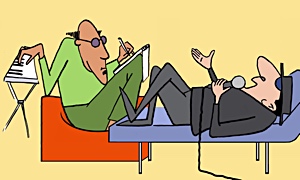Home » Jazz Articles » Mr. P.C.'s Guide to Jazz Etiquette and Bandstand Decorum » Saxophone Solos, Trumpet Wars, Clichéd Endings
Saxophone Solos, Trumpet Wars, Clichéd Endings

Saxophone Solos
Dear Mr. P.C.:Why is it that saxophonists have to fill every beat of every measure when they're soloing? Couldn't they leave an eighth note unplayed here and there?
—Rest in Piece?
Dear RIP:
I don't think you're being fair to saxophonists. Compare them to the pianist, bassist and drummer who get to play for the entire piece! The saxophonist patiently waits to solo, with nothing to do but listen to the band which—face it—can't play nearly as fast as they can. It's like they're being punished for being better than everyone else.
So the sax solo finally comes, and now you're telling them to hold back? You know what happens when a saxophonist leaves a rest in their solo? The audience hears the pianist, bassist and drummer again—as if they hadn't already been heard way more than their fair share! At that point, why even call it a sax solo?
Trumpet Wars
Dear Mr. P.C.:I play piano in a big band. You gotta start somewhere, right? I'm cool with the fact that I'm inaudible since no one can hear my mistakes (especially me). But what I'm not cool with is the contest the trumpet players have while we're individually warming up. You know: Who can play the highest, loudest note? It kills my ears and my spirits. What can I do about it?
—Shhhh
Dear Shhhh:
One minute you're telling me you appreciate not being able to hear your own mistakes. The next minute you're complaining that the trumpet players are killing your ears. By your own logic, they're doing you a favor. What did I miss?
Clichéd Endings
Dear Mr. P.C.:We all know the clichéd endings for jazz songs—the Ellington ending, the Basie ending, and others.... What I want to know is why so many musicians would choose to end a song, which might have been very creative and unique up to that point, with the same ending they've played (and the audience has heard) hundreds of times before.
—M.N., Seattle
Dear M.N.:
Being "creative and unique" might sound great to you as a musician, but most audiences feel differently. The more creative and unique the music gets, the more untethered they become. They come to the show knowing exactly what they want, and what they want is exactly what they've heard before, their tastes dictated by a fear of the unknown.
Why do even the most violent Hollywood movies have happy endings? How come so many gruesome fairy tales end "happily ever after"? It's so viewers and readers leave feeling good, no matter how depressing most of the experience was. That's exactly what Ellington and Basie endings are: musical happily-ever-afters.
Instead of begrudging the audience the resolution it wants, show some gratitude. After all, two quick measures at the end buy you unlimited self-indulgence for all the measures before them.
Have a question for Mr. P.C.? Ask him.
Tags
PREVIOUS / NEXT
Support All About Jazz
 All About Jazz has been a pillar of jazz since 1995, championing it as an art form and, more importantly, supporting the musicians who make it. Our enduring commitment has made "AAJ" one of the most culturally important websites of its kind, read by hundreds of thousands of fans, musicians and industry figures every month.
All About Jazz has been a pillar of jazz since 1995, championing it as an art form and, more importantly, supporting the musicians who make it. Our enduring commitment has made "AAJ" one of the most culturally important websites of its kind, read by hundreds of thousands of fans, musicians and industry figures every month.























